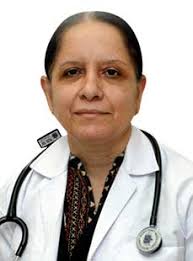Medical Advisor
Dr Damanjit Duggal is a practising Physician and Critical care specialist with over twenty-five years of experience. She is an instructor for Basic life support and advanced cardiac life support. She is an eligible teacher for IDCCM and Respiratory medicine. She led the Intensive care unit of BM Birla Heart Research Centre
Kolkata, Sri Ramachandra Medical College Chennai and Ruby Hall Clinic Pune. She has had the honour of setting up an ICU at Sri Aurobindo Seva Kendra Kolkata. Dr Damanjit is presently working as a Consultant in Medicine and Critical Care at Ruby Hall and Sahyadri Hospitals Pune.
Education
- MBBS, B J Medical College, Pune, 1985
- MD (Respiratory Med), B J Medical College, Pune, 1989
- IDCCM (CRITICAL CARE), B J Medical College, Pune, 2008
Experience
- 2011 till present, Consultant Medicine (Pulmonology, Cardiology, Diabetes) and Critical Care, Ruby Hall and Sahayadri Hospitals Pune
- April 1996 - 2011, Incharge Consultant ICCU/ICU of Ruby Hall, Pune
- 31 July 1995 – 22 February 1996, Assistant Professor of General Medicine working in the Dept. of Cardiology of Sri Ramachandra Medical College & Research Institute, Madras
- 16 February 1995 to 26 April 1995, Resident cardiologist and ICCU/ICU in charge in Sri Aurobindo Seva Kendra, Kolkata
- 01 Aug1993 to 09 Feb1995, Registrar Cardiology, BM Birla heart research centre, Kolkata
- 25 Jan 1990 to 17 Apr1992, Senior Registrar ICCU/ICU Ruby Hall, Pune
Publications
- Effects of Reviparin low molecular weight heparin on mortality, reinfarction and strokes in patients with acute myocardial infarction presenting with ST-segment elevation. JAMA. Jan 26,2005-vol 293 no 4, page 427.
- Importance of ambulatory blood pressure monitoring. Journal of therapeutic advances. April-June 2012 issue no 5.
- Palliative management of lymphangioleiomyomatosis using video-assisted thoracoscopic surgery. Bronchial intervenes in Pulmonol. Jan 2014 vol 21 no 1.
- Uncommon causes of asthma-like presentation. Research journal of pharmaceutical biological and chemical sciences. May June 2015, page 661.
- Pleural fluid ADA in diagnosis of pleural effusion . JEMDS. Vol 6 issue 60 July 27,2017, page 4421.
Common diabetes symptoms in women include increased thirst, frequent urination, fatigue, unexplained weight loss, blurred vision, and slow-healing wounds. Specific signs may also include yeast infections, urinary tract infections (UTIs), and polycystic ovary syndrome (PCOS)-related symptoms. These symptoms can signal high blood sugar levels and should prompt medical attention for diagnosis and management.
Among women, insulin resistance is a developing health issue that frequently goes undiagnosed until symptoms get worse. It affects the body’s ability to use insulin effectively, leading to various health issues. Recognizing early signs, like unexplained weight gain or fatigue, is key to managing and preventing complications. In this blog, we’ll explore common insulin resistance symptoms …
As the festive season approaches, especially with Diwali and New Year celebrations, there’s an undeniable excitement in the air. These festivals are synonymous with lights, joy, and indulgent feasts, with sweets holding a place of pride on every table. However, for people managing diabetes, this can bring about a wave of anxiety. The allure of traditional …
Prediabetes affects millions of people worldwide. However, many men remain unaware of the early signs. Recognizing the symptoms of prediabetes is crucial to preventing it from progressing into type 2 diabetes, a condition with more severe health risks. Men, in particular, may experience unique risk factors and warning signs. In this blog, we’ll explore the most …
In Indian homes, chapati, also known as roti, is a constant for a nutritious, well-balanced meal. Made primarily from whole wheat flour, it’s rich in essential nutrients and provides a good energy source. Understanding the nutritional profile of chapati is crucial for those tracking calories or managing their weight. This blog will explore wheat roti calories, …
Did you know that 96 million U.S. adults have prediabetes? Without intervention, many could develop Type 2 diabetes within five years. But here’s the good news: prediabetes can be reversed, and it doesn’t have to take years. Dedication and the right approach can potentially turn things around in just 3 months. This blog post will guide …




 English
English













